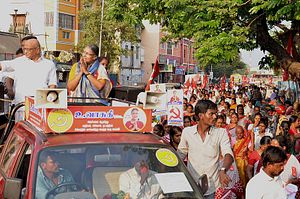With the South Indian state of Tamil Nadu all set to head to the polls on May 16, candidate nominations have been filed and party manifestos are being hotly discussed.
There are four main groups scrabbling for power this election and fielding chief ministerial candidates. The All India Anna Dravida Munnetra Kazhagam (AIADMK), fielding current Chief Minister Jayalalithaa, is affiliated with neither national party alliance from the center, though smaller groups like the Dalit Christian Liberation Movement (DCLM) have offered their support to it.
The Dravida Munnetra Kazhagam (DMK), fielding M Karunanidhi, has allied with the Congress, but has not included the Tamil Maanila Congress (TMC) under GK Vasan, a faction that broke off from the Tamil Nadu Congress Committee (TNCC) and will be contesting its first election outside the umbrella of the party. The Pattali Makkal Katchi (PMK), fielding Dr. Anbumani Ramadoss, will not be affiliating with the National Democratic Alliance (NDA) this time, as it has in the past and will instead be contesting all 234 seats on its own.
The six-party alliance, sometimes labeled as the Third Front, consists of the Desiya Murpokku Dravida Kazhagam (DMDK), the People’s Welfare Front (PWF) and the TMC faction, with the PWF consisting of a group of four parties – the Communist Party of India (CPI), the Communist Party of India-Marxist (CPI-M), the Viduthalai Chiruthaigal Katchi (VCK), and the Marumalarchi Dravida Munnetra Kazhagam (MDMK). They, together, are fielding actor-politician Vijayakanth as their chief ministerial candidate.
Although the candidates currently are indulging in a game of calling each other out on the infeasibility of different policies and the carry-over of promises from previous years, there is much more convergence among their ideas than what the parties appear to let on.
The DMK-Congress, the AIADMK, the PMK, and the BJP have all, for instance, stood on a platform of instituting alcohol prohibition in the state. This is complicated by the fact that the Tamil Nadu State Marketing Corporation (TASMAC) shops that sell alcohol reportedly account for a significant portion of state revenue, and thus loss of this has been calculated to be about a third of government revenue.
The DMK alliance has been accused of not accounting for this revenue loss while pitching multiple loan waivers (for first-generation college students, for farmers, etc.) and comprehensive housing projects that will lead the exchequer into a loss if there are no measures taken to bounce back from the loss of alcohol revenue.
They have in turn called out the AIADMK for their phased plan to install prohibition, arguing that the party lacks the will to impose this, but also that, ironically, the speed of implementation will not be fast enough. The BJP stands on the platform that it is the only party to have successfully managed such a ban (in the state of Gujarat) and thus proclaims itself the only stakeholder that can realistically deliver on this promise.
The PMK on the other hand was among the earliest to field the idea and is sarcastically encouraging the others on following suit.
On one hand, prohibition forms part of this contentious discussion; on the other hand, all parties concerned seem to be keen on expansion and connectivity.
The DMK alliance is addressing this through their “only freebie” proposal that would ensure the provision of smartphone and 3G/4G connectivity for families that cannot afford it. They join the PMK’s promises to expand Metro Rail connectivity to parts of Tamil Nadu beyond just the capital, Chennai.
With the wounds left by the Tamil Nadu Floods of December 2015 still raw, all parties have made the management of floodwater and storm-water drainage systems a priority, with the Congress attempting to throw the lack of implementation of their legislation on Disaster Management at the feet of the AIADMK.
However, the traditional two main parties — the DMK and the AIADMK — are both facing a lot of criticism for not taking up the project of renewing the Palar river seriously enough. They are each attempting to win the PR campaign on this issue while the state is moving towards its hottest summer yet.
The final point of convergence across manifestos is that of gender issues. The DMK has promised a safety app for women in an attempt to ensure more public safety. The AIADMK is emphasizing that under its current reign, Tamil Nadu has been declared one of the safest states for women in India.
Both the DMK alliance and the PMK have strongly called for better legislation on maternity leave as well as compulsory sexual harassment committees in offices, with the PMK proposing special buses to increase public safety for women. The Congress has called for increased quotas for women in local bodies and a 2 percent quota for transgender individuals as well.
Interestingly, in a state that is known for its temples, the two rivals at the center, the BJP and Congress, have both made the same promise of returning the management of temples to private trusts and removing them from the control of the government, thus allowing for even a greater convergence of choices across manifestos.
In an election that is supposedly opening up the space for more small parties and providing an opening for these parties to beat traditional powerhouses, a close observation of manifestos perhaps leaves the electorate wondering what these diverse choices are, if there even are any.
The choice on May 16 seems to boil much more down to who the electorate in the state is willing to trust (or perhaps trust again) to bring the same radical changes that they all seem to be promising.

































